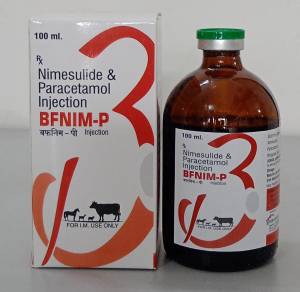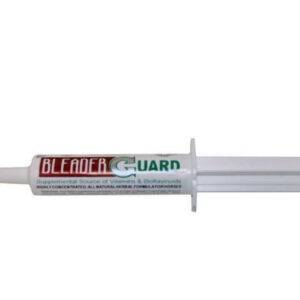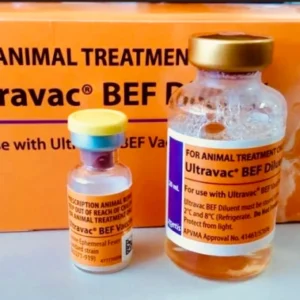Nimesulide and Paracetamol Injection Veterinary
Nimesulide and Paracetamol Injection Veterinary is a combination veterinary medication that combines two complementary therapeutic agents: nimesulide (a COX-2 selective NSAID) and paracetamol (acetaminophen, an analgesic and antipyretic). Nimesulide Paracetamol is a relatively COX-2 selective, non-steroidal anti-inflammatory drug (NSAID) with analgesic and antipyretic properties.
Active Ingredients and Mechanism
Nimesulide Component:
Veterinary Nimesulide Paracetamol Injection is a non-steroidal anti-inflammatory drug (NSAID) of the oxicam class which acts by inhibition of prostaglandin synthesis, thereby exerting anti-inflammatory, anti-endotoxic, ant exudative, analgesic and antipyretic properties.
Dual-Action Mechanism:
Nimesulide: COX-2 selective inhibition providing anti-inflammatory, analgesic, and antipyretic effects
Paracetamol: Central analgesic and antipyretic action through different pathways
Synergistic Effect: Combined action provides enhanced pain relief and fever reduction Nimesulide and Paracetamol Injection Veterinary
Additional Properties:
In addition, nimesulide has a range of other anti-inflammatory effects, including inhibition of the neutrophil oxidative response and inhibition of platelet activating factor.
Clinical Indications
Cattle Applications:
CATTLE – For use in acute respiratory infection and diarrhoea in combination with appropriate antibiotic therapy to reduce clinical symptoms in calves and young cattle. For use in acute mastitis, in combination with antibiotic therapy, as appropriate, to reduce clinical symptoms in lactating cows.
Specific Cattle Uses:
Respiratory Infections: Adjunct therapy with antibiotics for respiratory disease
Diarrhea: Supportive treatment in combination with antimicrobials
Mastitis: Adjunct to antibiotic therapy for inflammatory symptoms
Fever Reduction: Control of pyrexia associated with infectious conditions
Swine Applications:
PIGS – For use in acute non-infectious locomotor disorders to reduce the symptoms of lameness and inflammation. For use in puerperal septicaemia and toxaemia (mastitis-metritis-agalactia syndrome) with appropriate antibiotic therapy to reduce clinical signs of inflammation. Nimesulide and Paracetamol Injection Veterinary
Specific Swine Uses:
Locomotor Disorders: Treatment of lameness and associated inflammation
MMA Syndrome: Mastitis-metritis-agalactia complex management
Puerperal Conditions: Post-farrowing complications
Inflammatory Conditions: General anti-inflammatory support
General Therapeutic Applications:
Adjunct antibiotics in severe infections to reduce high fever.
Pharmacological Properties
Nimesulide Characteristics:
COX-2 Selectivity: Preferential inhibition of COX-2 over COX-1
Anti-inflammatory: Reduces inflammatory mediator production
Analgesic: Pain relief through prostaglandin inhibition
Antipyretic: Fever reduction via hypothalamic action
Anti-endotoxic: Counters effects of bacterial endotoxins
Paracetamol Characteristics:
Central Action: Primary analgesic and antipyretic effects in the CNS
Complementary Mechanism: Different pathway from NSAIDs
Synergistic Effect: Enhanced overall therapeutic benefit when combined. Nimesulide and Paracetamol Injection Veterinary
Research and Clinical Studies
Canine Studies:
The present experiment was designed to determine a dosage regimen (dose, interval of administration) in the dog for nimesulide, a nonsteroidal anti-inflammatory drug with in vitro selectivity for the inhibition of cyclo-oxygenase 2 (Cox-2), using a pharmacokinetic/pharmacodynamic (PK/PD) approach.
It is commonly used to reduce the pain and inflammation associated with osteoarthritis in dogs.
Dosage and Administration
General Principles:
Injectable formulation for immediate therapeutic effect
Dosage varies by species, body weight, and clinical condition
Professional veterinary administration required
Often used as adjunct therapy with appropriate antibiotics
Administration Routes:
Intramuscular: Primary route for most applications
Intravenous: May be used in specific clinical situations
Professional Oversight: Veterinary supervision required
Combination Therapy Considerations
Antibiotic Combinations:
The product is frequently used in combination with antimicrobial therapy for:
Enhanced clinical response in infectious conditions
Symptomatic relief while antimicrobials address underlying infection
Improved animal comfort and welfare during treatment
Reduced inflammatory complications
Clinical Benefits of Combination:
Comprehensive Treatment: Addresses both infection and inflammation
Improved Outcomes: Better clinical response than single-agent therapy
Animal Welfare: Reduces pain and discomfort during illness
Faster Recovery: May accelerate return to normal function. Nimesulide and Paracetamol Injection Veterinary
Safety Considerations
Professional Use Requirements:
Veterinary prescription required Nimesulide and Paracetamol Injection Veterinary
Professional administration recommended
Proper dosage calculation essential
Monitoring for adverse effects necessary
Contraindications and Precautions:
Avoid in animals with known NSAID sensitivity
Caution in animals with renal or hepatic dysfunction
Monitor for gastrointestinal effects
Consider drug interactions with other medications
Species-Specific Applications
Large Animals (Cattle):
Primary focus on respiratory and mammary gland infections
Supportive therapy in digestive disorders
Post-calving complications management
Swine:
Locomotor disorder management
Reproductive disorder support
Post-farrowing care
Nimesulide and Paracetamol Injection Veterinary Small Animals:
Research indicates potential applications in dogs and cats, though specific veterinary formulations may vary by region and regulatory approval.
Regulatory Status
The combination product is available through veterinary channels in various international markets, with specific formulations and approved indications varying by country and regulatory authority. Professional veterinary oversight is required for appropriate use. Nimesulide and Paracetamol Injection Veterinary
Clinical Monitoring
Response Assessment:
Monitor for fever reduction
Assess improvement in clinical signs
Evaluate pain and discomfort levels
Watch for potential adverse effects
Treatment Duration:
Typically used for acute conditions
Duration based on clinical response
Professional assessment guides treatment length
May require repeat dosing based on severity
This combination injection provides veterinarians with a valuable tool for managing pain, fever, and inflammation in various species, particularly when used as part of comprehensive treatment protocols that may include antimicrobial therapy for optimal clinical outcomes. Nimesulide and Paracetamol Injection Veterinary





Reviews
There are no reviews yet.